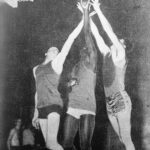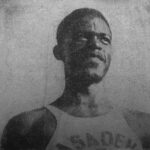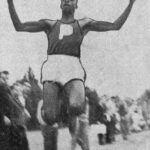Before becoming a pioneer for equality throughout professional sports by breaking baseball’s color barrier in 1947, Jack Roosevelt Robinson was a successful four-sport athlete at what was then called Pasadena Junior College. Known for his athleticism and prowess on the baseball diamond, Robinson was also a prolific scorer on the hardwood while also playing football and track for the Bulldogs.
The youngest of five children, Robinson was preceded at PJC by his older brother and Olympic silver medalist Matthew ‘Mack’ Robinson. Although the two brothers were competing for the Bulldogs during a difficult era in American history, the outstanding athletes would go on to become pioneers at PJC and around the country.
“I think his impact on our society is even greater than the impact we’ve embraced here at Pasadena City College,” former minor league baseball manager and PCC athletic director Tony Barbone said. “Obviously we claim him as ours and the impact he’s had on our campus and area campuses has become a marker for all walks of life.”
A graduate of Muir Technical in Los Angeles, Jackie followed his brother’s footsteps and enrolled at PJC where he played quarterback and safety on the football team, shortstop on the baseball team, and forward on the basketball team. He also competed in track and field from 1936 to 1938. The Courier, then called the Pasadena Chronicle, closely followed his many achievements.
“Jackie Robinson, kid brother of Mack, Pasadena’s world renowned Olympic star, has been cutting up capers in night games at Brookside Park,” The Chronicle wrote in a 1938 Spring publication. “Jack, regular shortstop on John Thurman’s varsity nine, has been showing as much speed on the basepaths as his more famous brother does down the cinderpath.”
After a successful freshman season at PJC, Robinson returned to the football field on October 29, 1937 after missing the beginning of the football season with a foot injury. In his return, Robinson made his mark on junior college football against Cal Tech.
“In football [Robinson] came late in the season after being out with a broken foot to steal the show and to prove the finest open field runner in junior college circles,” The Chronicle said of Robinson on June 4, 1938. “His sensational 70 and 80 yard touchdown runs against Cal Tech will long remain as highlights in the annual of Bulldog football.”
Robinson was an important piece of Pasadena’s success and, along with captain Bill Busik, he led the Bulldogs to a 6-3-1 record.
On the basketball court Robinson also excelled, finishing second among the top ten scorers in Southern California with 121 points. With his leaping and scoring ability, Robinson led the Bulldogs to a fourth place finish in the 1938 Western Division.
On December 20, 1937 Robinson helped lead PJC to a 41-29 victory over the defending state champion Modesto Pirates. Robinson was instrumental in the Bulldogs’ victory, leading all scores in the contest with 18 points.
Less than two weeks later Robinson recorded a game-high 20 points in the Bulldogs 53-49 overtime loss to Sacramento Junior College. Although the Bulldogs were unable to come away with the victory, Robinson carried PJC with timely baskets. With 20 seconds remaining in regulation it was a Robinson field goal that helped the Bulldogs extend the game.
“Jackie Robinson is more than a legend,” men’s basketball head coach Michael Swanegan said. “He’s a pioneer who paved the way for many athletes and coaches like myself. The opportunities we’re given today are because of him. He was a strong and willful athlete who broke barriers so that everyone can have equal opportunities and for that I am beyond thankful.”
In 1938 Robinson was named The Most Outstanding All-Around Athlete of the Year by the Chronicle Sports Page and was named the region’s Most Valuable Player in baseball after batting .417 with 43 runs scored and 25 stolen bases in just 24 games. Robinson was also named to the 1938 All-Southern California baseball team.
“The Most Outstanding All-Around Athlete of the Year,” was the title of honor conferred upon Robinson by the Chronicle Sports Page that year. “If the page had been naming the greatest all-around athlete ever to attend PJC, Jackie would have also captured this honor.”
Not to be outdone by his older brother Mack, Jackie would go on to excel in track in field as well.
Jackie was an important member of the Bulldog’s state championship track team in 1938 and would go on to eclipse his brother’s broad jump record with a then national record of 25-feet-6½-inches.
“Jackie Robinson erased another of his brothers marks, in winning the broad jump at the West Coast Relays with a mark of 24-feet-9-½-inches,” The Chronicle noted in a 1938 publication. “Last week Jackie set a new national jaysee record in the broad jump of 25-feet-6-½-inches in the S.C. Jaysee finals,”
Not only did Jackie Robinson display a rare athletic talent that helped PJC succeed in numerous sports, the talented Robinson was also pioneer who helped break barriers not only in baseball but all of professional and collegiate sports.
“I make it a point to show the Jackie Robinson movie ‘42’ because I think it’s really important for our students to know who Jackie Robinson is,” current women’s head basketball coach Joe Peron said. “For me personally I’m happy and honored just to be associated with the fact that he came here to Pasadena City College…Just to know that he went here and I played one of the many sports he played is very humbling to me.”
After graduating from PJC, Robinson pursued his education at the University of California, Los Angeles, where he became the university’s first student-athlete to win varsity letters in four sports.
In 1941, Robinson moved to Honolulu, Hawaii, where he played semi–professional football for the Honolulu Bears. His season with the Bears was cut short when the United States entered into World War II.
Before going on to make history with the Brooklyn Dodgers, Robinson began playing professional baseball in the Negro League in 1944.
“I don’t think many of us have faced the challenges he faced,” Barbone said. “It was a good educational time for those of us but for me, for years, to go into baseball stadiums as a minor league baseball manager and understand what 42 meant and the energy that it carries now is replicated in his greatness as a person and the retirement of his number on a national basis is more about him and who he is than what he did.”
- Sophomore swimmer eyes state championship - April 29, 2015
- Pasadena’s own four sport legend - April 29, 2015
- Softball unable to clinch playoff berth - April 23, 2015



